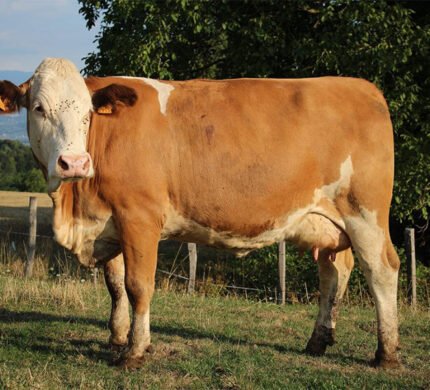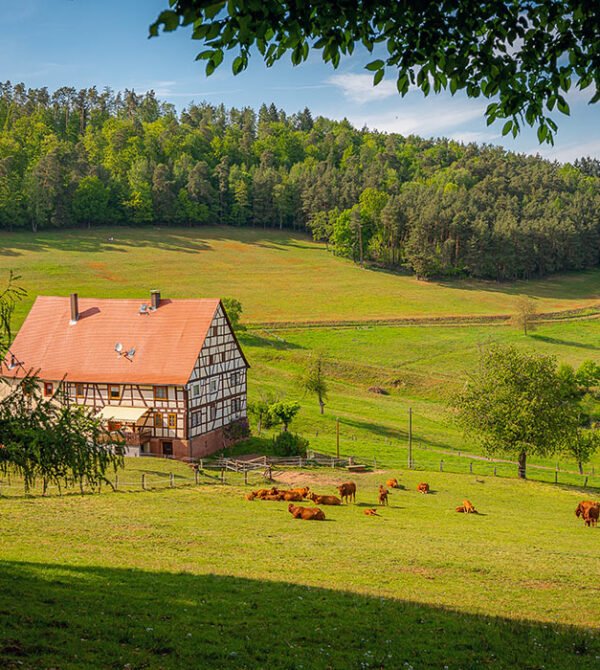Simmental Cattle
- Temperature:100.4°F and 102.8°F
- Milk:5,000-7,000 liters of milk per lactation
- Food:Grasses, Hay and Grains
- Pregnancy:Approximately 283 days
- Nationality:North-eastern Scotland

General Information
Simmental cattle are a breed of cattle that originated in Switzerland. They are one of the oldest and most versatile breeds of cattle in the world. Simmental cattle are large, muscular animals with a distinctive reddish-brown and white coat pattern. They are primarily used for beef production but can also be used for milk production.
Simmental cattle are known for their docile temperament, good mothering ability, and adaptability to a range of environments. They are often crossbred with other breeds to improve traits such as growth rate, feed efficiency, and meat quality.
Simmental cattle have a long history, with records of the breed dating back to the Middle Ages. They were first imported to the United States in the late 1800s and have since become a popular breed for commercial beef production.
Today, Simmental cattle are found in many countries around the world, including the United States, Canada, Australia, and many European countries. They are known for their excellent growth rates and efficient feed conversion, making them a popular choice for beef producers.
Where we find this cow to buy?
Simmental cattle are a popular breed of cattle that can be found in many countries around the world. Depending on where you are located, there are a few options for purchasing Simmental cattle:
01. Local breeders and farmers : Check with local breeders and farmers in your area who specialize in Simmental cattle. You can search for them online, through agricultural trade publications, or by visiting local agricultural fairs and shows.02. Livestock auctions : Simmental cattle are often sold at livestock auctions, which can be found in many rural areas. Check online or in local classified ads for upcoming auctions in your area.03. Online Marketplaces: There are also online marketplaces that specialize in buying and selling livestock, including Simmental cattle. Some popular websites include Cattle-exchange.com, Livestock.com, and Cattle-range.com.04. Breed Associations: Simmental cattle have several breed associations, such as the American Simmental Association, Canadian Simmental Association and World Simmental Federation, which can provide a list of breeders and farmers in their area.

How to increase milk production in Simmental Cattle?
There are several ways to increase milk production in Simmental cattle:
You can consider adding supplements such as probiotics and prebiotics to your Simmental cattle’s diet to improve their digestion and overall health.
Make sure that your Simmental cattle receive proper herd management practices such as regular vaccinations, deworming, and veterinary care.
Choose Simmental cattle that have strong genetics for producing milk. This can be accomplished by choosing sires with a history of high milk output.
Milking your Simmental cattle frequently can stimulate milk production. The recommended milking frequency is twice per day.
Make sure that your Simmental cattle have access to a clean and adequate water supply. Water is essential for milk production.
Provide Simmental cattle with high-quality forages, grains, and supplements to meet their energy and protein needs.
Medicine
Simmental cattle, like all animals, may require medicine to treat or prevent various diseases and health conditions. Some common medicines that may be used for Simmental cattle include:
01
AntibioticsThese are used to treat bacterial infections such as respiratory infections, mastitis, and foot rot.
02
AnthelminticsThese are used to treat or prevent internal parasites such as roundworms, tapeworms, and flukes.
03
Anti-inflammatory DrugsThese are used to reduce inflammation and pain in conditions such as arthritis, lameness, and mastitis.
04
HormonesThese may be used to regulate reproductive cycles and improve fertility in Simmental cattle.
Pregnancy
Simmental cattle, like all cattle, have a gestation period of approximately 283 days (about 9 months). Here are some general information about pregnancy in Simmental cattle:
Pregnancy can be diagnosed by a veterinarian through palpation or ultrasound, which can detect a fetal heartbeat as early as 28 days.
In some cases, assistance may be needed during calving. This may include correcting malpresentations, such as a breech calf, or providing traction to help deliver the calf.
Pregnant Simmental cattle should be closely monitored for any signs of illness or disease, as they can affect the health of the fetus. Routine vaccinations and deworming should also be administered.
As the due date approaches, pregnant Simmental cattle should be provided with a clean and comfortable area for calving. It’s important to have a calving kit prepared with supplies such as obstetrical chains, towels, and iodine solution for disinfection.
Pregnant Simmental cattle should be provided with high-quality forage and a well-balanced diet that meets their energy and protein requirements. Adequate nutrition is crucial for fetal growth and development.
After calving, Simmental cattle should be monitored for any signs of postpartum complications such as retained placenta, metritis, or mastitis. Good nutrition and proper herd management can help prevent these complications.
Important!
It’s important to note that proper pregnancy management is essential for the health and productivity of both the cow and calf. Consult with a veterinarian or experienced livestock specialist for specific recommendations regarding pregnancy management in Simmental cattle.
Food
Simmental cattle, like all cattle, require a well-balanced diet that meets their nutritional needs for maintenance, growth, and reproduction. Here are some foods that are commonly fed to Simmental cattle:
High-quality forage is essential for a Simmental cattle’s diet, providing fiber, energy, and protein, as well as vitamins and minerals.
Grains such as corn, barley, wheat, and oats are often used to supplement the energy and protein content of the diet.
Protein supplements can be added to the diet to increase protein content during times of stress or low forage quality.
Mineral supplements are essential for essential minerals and trace elements, and can be added to feed or provided free-choice.
Fresh water should always be available to Simmental cattle. Water is essential for digestion, milk production.
Facts
Simmental cattle are a breed of dual-purpose cattle that originated in the Simme Valley of Switzerland. Here are some facts about Simmental cattle:
They have reddish-brown coats and white markings on their faces, bellies, and legs.
They are the largest breeds of cattle, weighing between 2,200 and 3,300 pounds.
They are known for their high milk production and are used for cheese production.
They are known for their high-quality beef, often marbled and flavorful.
They are favored by farmers and ranchers because of their pleasant and docile disposition.
They are adaptable to a variety of climates, making them popular around the world.
They are used to improve the meat and milk production of other breeds.
Simmental cattle were introduced to the US in the 1800s, becoming a popular breed for ranchers and farmers.